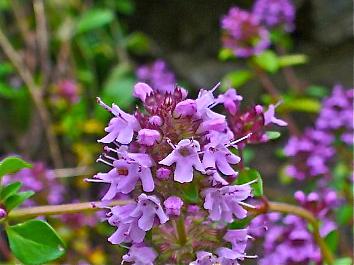Thyme is without a doubt one of the most useful herbs we have at our disposal, being a powerful germicide with carminative and anti-inflammatory properties. It is described by one of the preeminent herbalists of our time Dorothy Hall as being “powerfully protective and therapeutic”, and one of the “big three of herbal medicine”.
During the Middle Ages, thyme was grown in the monastic gardens of Italy, France and Spain and used to treat those suffering from poor digestion, intestinal parasites and a sore throat. Herbalists used thyme as a powerful germicide to treat patients infected with the plague that swept through Europe between the fifteenth and seventeenth centuries.
In 1725 a German apothecary ‘discovered’ thymol, the powerful disinfectant present in the essential oil of thyme, which is effective against bacteria and fungi. Thymol has been found to be very similar to carbolic acid in its action, though more powerful against infection and less irritating to the skin.





